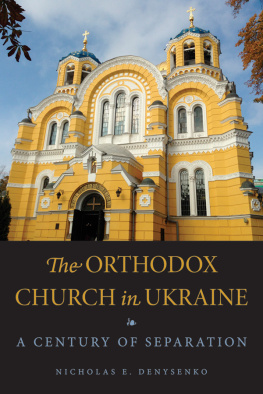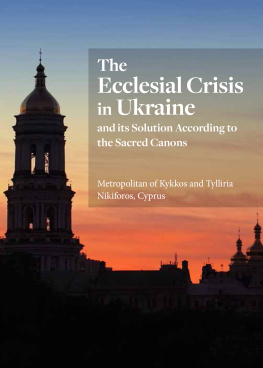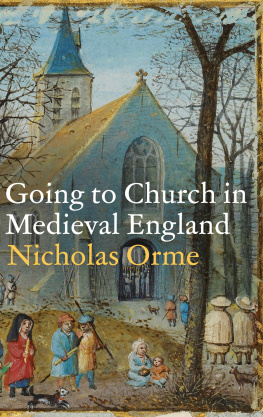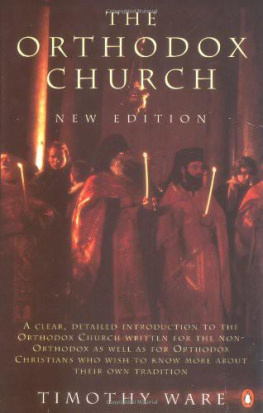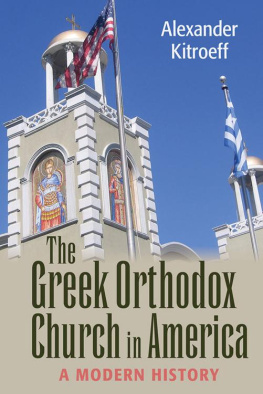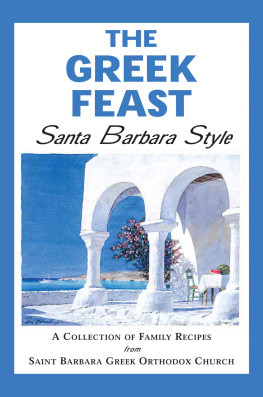Excerpts from the Tymofii Minenko archive at the University of Alberta in Edmonton used with permission.
Excerpts from , vol. 1: [Martyrology of the Ukrainian Churches, vol. 1: The Ukrainian Orthodox Church], edited by Osyp Zinkewich and Oleksander Voronyn (Baltimore, MD: Smoloskyp Publishers, 1987), used with permission.
Excerpts from documents gathered by Mr. Yaroslaw Lozowchuk used with permission.
Library of Congress Cataloging-in-Publication Data is available online at http://catalog.loc.gov
Acknowledgments
When I was an eighteen-year-old freshman at the University of Minnesota in 19901991, the world around me was changing. For the entirety of my young life, the possibility that the Soviet Union might collapse and that independent nations would emerge from the imperial wreckage amounted to a fools hope. By the end of 1991, it was hard for me to believe that Ukraine was independent. As a child, I attended the Ukrainian Orthodox parishes of my family, and our parish was always the one shepherded by my grandfather, the archpriest (and later protopresbyter) Nicholas Metulynsky. It was upon enrolling at the university and joining the Orthodox Christian Fellowship that I discovered that we were uncanonical and self-consecrated as adherents of the Ukrainian Autocephalous Orthodox Church. The passions of youth prevented me from reflecting patiently on my encounters with my Orthodox Christian peers, so I took my frustrations to my grandfather. The next several years constituted a domestic crash course in the history of the Orthodox Church in Ukraine. I would visit my grandparents home and immerse myself in his fascinating library of books and periodicals, trying to understand the perspective of my fellow Orthodox.
The experiences of my youth functioned as an introduction to a world that is even more complex than I had imagined it to be. My musical skills brought me to non-Ukrainian Orthodox parishes where I learned the unique histories of other traditions. Inspired by the legacy of Alexander Schmemann, I pledged myself to the cause of establishing an authentically local Orthodox Church in America, rooted in mission, by joining the Orthodox Church in America and attending its renowned St. Vladimirs Seminary. Eventually, I immersed myself in liturgical studies, and have been blessed to land my first appointment, and tenure, at Loyola Marymount University in Los Angeles. My path continues to be blessed, as I begin a new chapter as Jochum Professor and chair at Valparaiso University in Indiana.
As I continued my work in liturgical studies, I never forgot my crash course in Ukrainian church history. I exchanged hundreds of e-mails on the chaotic church situation in Ukraine, and discovered that many of my peers had no knowledge of the Church in Ukraine. I wrote a handful of articles and essays in an attempt toexplain the intra-Orthodox tensions in Ukraine for English-speakers These initial presentations evolved into a series of conference papers, and before I knew it, I already had collected much of the material needed for this book. My objective is the same as it was originally: to explain the situation of the Orthodox Church in Ukraine as clearly as possible. The primary purpose of the book is to illustrate how aspirations for autocephaly and church renewal caused the Orthodox Church in Ukraine to splinter over the span of one hundred years. The features and objectives of autocephaly developed a stigma of ecclesial illegitimacy, and the inability of church leaders to shed this stigma has deepened the divisions and sharpened intrachurch polemics. I hope I have achieved this objective with this book: let the reader decide.
Every study is the result of dialogue with others, and dozens of people have helped me think through the issues featured in this book. Amy Farranto has been a patient and devoted editor, gently guiding me through the publication process and encouraging me to make the changes needed to improve the text and its arguments. Im very grateful to Amy for her devotion to publishing this book! Sincere thanks to Dr. Antoine Arjakovsky, Dr. Paul Gavrilyuk, Dr. Roy Robson, and Dr. Christine Worobec, who read multiple drafts and provided me with the critical insight needed to strengthen the manuscript and clarify its arguments. I extend my thanks to numerous people who have engaged me in discussion, especially Dr. Michael Andrec, Nataliya Bezborodova, George Demacopoulos, Fr. Andrii Dudchenko, Daniel Galadza, Fr. Peter Galadza, Brandon Gallaher, Jacob Grekhovetsky, Fr. Dellas Oliver Herbel, Archimandrite Cyril Hovorun, Fr. Paul Koroluk, Fr. Heorhii Kovalenko, Yaroslaw Lozowchuk, Petro Melnyk, Aristotle Papanikolaou, Fr. Michael Plekon, Dr. Constantine Sigov, Frank Sysyn, Halyna Teslyuk, and Fr. Roman Zaviyskyy. I have received encouragement from bishops of the churches who have answered questions and provided me with guidance on sources. Special thanks to Metropolitan Oleksandr (Drabinko) of the UOC-MP, who ensured that I received posthumously published works of the ever-memorable Metropolitan Volodymyr (Sabodan), and Archbishop Yevstratiy (Zoria) of the UOC-KP, who answered my questions patiently. Metropolitan Yurii (Kalishchuk) of the UOCC, and Metropolitan Antony (Scharba) and Archbishop Daniel (Zelinsky) of the UOC-USA have also supported my efforts. Ms. Larissa Bulya of the UOC-USA library in South Bound Brook, New Jersey, sent me several hand-picked issues of the Ukrainian Orthodox Word for two projects.
This book would have been impossible without the gracious assistance of the Canadian Institute of Ukrainian Studies at the University of Alberta in Edmonton. I made two trips to Edmonton, one to deliver the Bohdan Bociurkiw memorial lecture in February 2015, and the other to immerse myself in the Tymofii Minenko archives and the Bohdan Bociurkiw Memorial Library. My second tripwas made possible by the Anna and Nikander Bukowsky research grant I received from the Canadian Institute of Ukrainian Studies. Dr. Volodymyr Kravchenko and Ms. Iryna Fedoriw were terrific hosts, and Mr. James Franks made research in the archive a pleasant experience. I am especially grateful to Dr. Heather Coleman for numerous engaging discussions about Ukrainian and Russian history, and for her friendship.
In closing, I return to the beginning, the intense discussions about the Ukrainian Orthodox Church that occurred in my youth. As a young adult, I was entranced by the beautiful music of Kyrylo Stetsenko, priest and musician of the 1921 UAOC (18821922). His niece, Mrs. Kira Tsarehradsky, carried on the Ukrainian musical heritage in the Twin Cities area with skill and grace, and she shared many stories of family reminiscences of the UAOC with me, for which I am very grateful. Thanks to my parents, Eugene (d. 2005) and Olga (d. 2017), who encouraged us to learn about our heritage. My brother Greg and I learned more from our grandparents, Fr. Nicholas and Matushka Margarita, than we could have learned from books, so I dedicate this work to them. In 2016, my wife Tresja and daughter Sophia traveled to Kyiv and Lviv with me. They tolerated my passion and wonder with the unconditional love of family, and I thank them.

